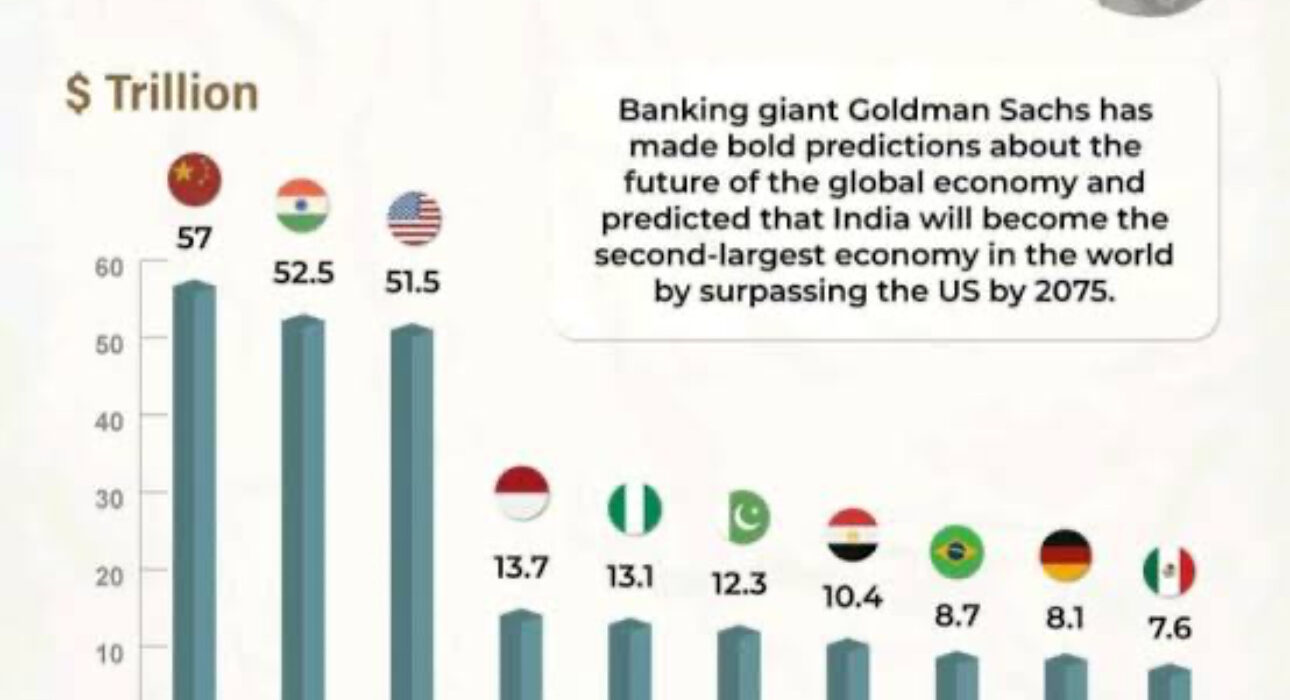Nigeria to be Fifth-Largest Economy by 2075, Says Goldman Sachs Report

In a fresh report, Goldman Sachs has predicted that Nigeria will become the fifth-largest economy in the world by 2075 with a projected Gross Domestic Product (GDP) of $13.1 trillion. This tremendous boost in economic position places Nigeria ahead of established economies such as Germany, the United Kingdom, Brazil, and Egypt. The report points to the country’s enormous growth potential, attributing this to the existence of a rare combination of favorable demographics, natural resource endowment, and rapidly evolving technology environment.
Demographic expansion ranks among the main driving forces behind Nigeria’s economic boom. The country of Nigeria, with over 200 million inhabitants at the moment, has a predicted 1.1 billion population in 2075. With so many people growing, Nigeria ranks among the biggest countries in the world, only after China and India. Nigeria, boasting a huge youth population, will be sure to benefit from a git for its huge workforce, which will propel economic expansion and production.
Its growing population also provides huge consumer market potential in healthcare, education, and consumers that can be induced to stimulate more economic activity. Nigeria’s emerging middle class will be a significant force in driving its future consumption patterns and economic growth as a whole.
Nigeria has some of the globe’s biggest oil, gas, and mineral reserves and is one of the richest nations in Africa in terms of natural resources. Goldman Sachs identifies these resources as among the propelling reasons for the country’s economic ascension. The oil and gas sector, though historically volatile, is among the pillar sectors of the Nigerian economy. However, the report emphasizes diversifying Nigeria’s economic base in the future to stem its over-dependence on the oil sector.
Apart from oil, Nigeria also has untapped potential in manufacturing, mining, and agriculture. As the demand for sustainable and green technology increases globally, Nigeria’s abundant mineral resources hold the promise to find new opportunities for development in renewable energy sectors.
Yet another of Nigeria’s dazzling assets in its future economic growth is the rapidly emerging technology hub. Nigeria is a pioneer on the African continent for the continent’s tech revolution, particularly when it comes to the fintech industry. The business capital of Nigeria, Lagos, has become a hotbed for startup and innovation. Foreign investments are now being drawn by Nigerian businesses more and more, and the nation is ranked as one of the highest destinations on the African continent for venture capital.
The fintech industry, to this end, has been in the forefront of Nigeria’s economic revolution. As more people use smartphones, and online penetration increases, Nigerian tech firms are revolutionizing businesses such as banking, e-commerce, and education, positioning Nigeria as a strong player in the digital economy.
As great as the optimism, Nigeria still has a few challenges that are likely to stifle its chances of becoming the fifth-largest world economy. Goldman Sachs has also identified a few obstacles that would have to be overcome for the nation to attain its economic growth potential.
Infrastructure Shortfalls: Nigeria’s infrastructure remains underdeveloped, particularly in the transport, energy, and healthcare sectors. In an economy of this size, there are massive investments required in infrastructure to ensure businesses operate efficiently and the growing needs of the population are met.
Political Stability and Governance: Political instability and governance have in the past undermined Nigeria’s growth potential. Political stability and effective governance will be central to delivering a good business environment, investment, and the equitable distribution of resources.
Economic Diversification: While Nigeria remains so strongly reliant on the export of oil, the country should accelerate its push to diversify its economy. Agriculture, manufacturing, and services sectors must be developed to shield Nigeria from the volatility of world oil prices and to create sustainable long-term growth.
Goldman Sachs explains that while these projections are made on the basis of current trends and figures, there is a possibility of their happening being modified by unforeseen global circumstances or market fluctuations. The report, however, is a utopian master plan of Nigeria’s possible future, showing what Nigeria can be if it takes advantage of its population growth, natural wealth, and digital technology.
If Nigeria is able to overcome its current impediments and harness all of its potential, it could be included among the world’s largest economies in the mid-21st century as a credible economic giant of the globe.









